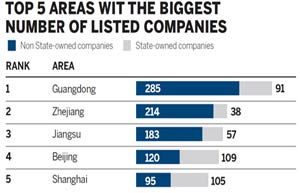The interim results of Chinese listed companies offer a mixed picture, with emerging industries demonstrating rapid growth while traditional sectors stall.
According to Hangzhou-based financial data service provider iFind, the 2,537 companies listed on the Shanghai and Shenzhen stock exchanges reported total first-half profits of 1.27 trillion yuan ($206.5 billion), up 10.13 percent year-on-year.
Companies listed on the ChiNext board, the Nasdaq-like stock market for innovative and fast-growing enterprises, reported net profit growth averaging 15 percent in the first half of the year.
The rapid growth of emerging industries has been noted by Shanghai-based Wind Information Co Ltd. It said that among the 362 listed companies in the information technology sector, 202 reported a gain in first-half net profit.
 |
The State Council said in a recent executive meeting that science and technology services should be developed by giving more weight to research and development, technological transformation and intellectual property.
"We have seen that companies belonging to the telecommunications, media and technology industries have performed quite well in the past few months, which is also a result of the central government's support policies. In the long run, such asset-light companies will be more nimble in the market and find it easier to achieve faster growth," he said.
While emerging industries are growing by leaps and bounds, traditional industries have been falling behind in the past six months. The property industry falls into that category.
Cao said the property sector faces an inflection point, which has affected a whole range of industries. Companies that make steel products and other building materials, as well as those producing interior decoration products and home appliances, saw tough times in the first half.
"The entire manufacturing industry has essentially stagnated in the past few months, except for those companies that have developed core technologies," said Cao.
Further, State-owned enterprises, which dominate resources in their industries, are posting huge losses. The interim results of China Railway Corp released on Monday show a loss of more than 5.3 billion yuan, even though the company has expanded its international business.
Aluminum Corp of China Ltd's loss reached 4.12 billion yuan in the first half.
These results "largely reflect current industry conditions". Most of these industries are confronted with the problem of overcapacity. If they cannot address this problem soon and effectively, there will be hardly any progress in the next few months, said Zhang Qi, a senior analyst from Shanghai-based Haitong Securities Co Ltd.
"Meanwhile, people are looking forward to the reform of diversified ownership in these large State-owned enterprises. Once that starts, the market will probably respond accordingly," Zhang said.
